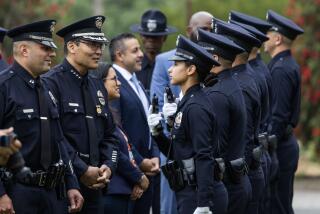Policing more than just the Westside
- Share via
It once was said of the Bourbons that in 300 years of ruling France, they learned nothing and forgot nothing.
Something similar can be said of a distressingly large segment of the Los Angeles City Council, too many of whose members never seem to forget the tired old arguments or to recall just how badly things went when the rules formulated according to them prevailed.
Take, for example, the controversy about whether the LAPD is stripping the Westside of adequate protection in order to staff new stations in Koreatown and the West Valley.
Now, it’s true that the nouns “injustice,” “scarcity” and “Westside” do not naturally conjoin or trip lightly off the tongue. But residents of the area, particularly in Pacific Palisades, seem to think otherwise. They argue that the LAPD’s plan to reduce the number of officers in the West L.A. station from 241 to 215 reflects an unwarranted emphasis on violent crimes rather than on offenses against property. In effect, they have suggested, people west of the 405 are being penalized for having too few homicides.
“It unfairly disadvantages our whole side of town,” said Richard G. Cohen, chairman of the Pacific Palisades Community Council, in an interview with The Times’ Richard Winton and Martha Groves. “It’s a particular problem for the Palisades, which is geographically remote, so response time will be jeopardized.”
Councilman Bill Rosendahl, who represents a good slice of the area, told The Times’ reporters that this is another example of how the Westside pays higher taxes and fees than the rest of the city and gets fewer services -- in this case because “their streets aren’t teeming with gun violence.” He’s upset because his district pays “good money for good protection,” he said. “We are not happy.”
The problem is that neither the facts of the case nor the history support all this pique. The LAPD these days is one of our civic success stories. Crime of all sorts is down across the city; relations between the department and the African American, Latino and gay communities are better than they’ve ever been. There are lots of reasons for the decline in crime, but one of the most significant is that, under Chief William J. Bratton, the LAPD has taken politics out of the way it assigns officers across the city.
For generations, the city labored under the legacy of the implicit bargain that Chief William Parker struck with the L.A. establishment when he was brought in to reform what was then probably America’s most corrupt police department.
Parker was honest but racist. He also was politically shrewd, and he came up with a cheap way to meet the needs of the white voters who ran the city. All they wanted from the LAPD were cops who came when they were called and who didn’t cost too much. Parker’s solution was a small police force that moved around in cars and was positioned to respond quickly when calls came in from white neighborhoods (at the expense, of course, of other neighborhoods). As long as he kept costs and response times low, he got a free hand to run the department pretty much as he pleased.
One of the singular changes Bratton brought to the LAPD was a rationalization of the department’s deployment. Officers now go where the need, rather than the political influence, is greatest. To that end, the LAPD uses a sophisticated computer program to come up with a yearly deployment plan. Every 28 days, adjustments are made to each division’s staffing based on the number of “category one” crimes -- a classification of serious offenses devised by the FBI that includes not only violent acts, like homicide, but also property crimes, like burglary.
Moreover, the department uses what amounts to special mobile strike forces of officers to respond to sudden spikes of crime in any area or to specific needs, as when many additional officers were deployed to the Westside to help manage anti-Proposition 8 demonstrations last month.
Through Saturday, for example, the LAPD’s 77th Division -- a notorious hot spot -- has had 2,607 violent crimes and 4,522 crimes against property, while the Westside has had just 428 violent offenses and 4,209 property crimes. When it comes to offenses against property, the West Valley trumps both divisions with 8,595 such crimes. Does anybody really think, by the way, that Koreatown has fewer property crimes than the Westside -- or is it that lives and property simply are worth less there?
The fact of the matter is that when all assigning factors are included, the Westside’s net loss of police officers as the result of this redeployment will be just 16, while the Rampart, Wilshire and Hollywood divisions -- all of which have more violent and property crime than West L.A. -- will lose 74, 82 and 52 officers, respectively. That’s for the perfectly logical reason that they’re also ceding territory to the new Koreatown station.
Cmdr. Kirk J. Albanese, who manages all this for the LAPD -- and who supplied The Times with these numbers -- points out that in most of the country, “departments still wet their fingers and stick it up into the political wind. Our system isn’t perfect, but it’s a lot closer to perfection than the ones still run that way.”
It’s hard to argue with that -- unless, of course, you’re mired in tired arguments and a discredited past.
--
More to Read
Sign up for Essential California
The most important California stories and recommendations in your inbox every morning.
You may occasionally receive promotional content from the Los Angeles Times.










